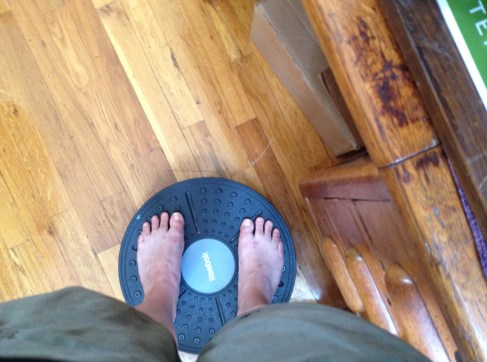I’m not very good at balance. I meant that to be a statement about work/life balance. I then thought I’d go on to say something about previous writing experiences, such as how book number one was written up mostly in one summer during which I sat at my kitchen table and did not get dressed or showered until my writing was a done for the day–an effective but isolating technique. So one of the goals for this sabbatical is to manage to be really ‘productive’ in the academic sense and not lose myself in it. To that end I went for a run. A short slow run. 2 miles in 22 minutes with a warm up and cool down on either side. It’s something.
But there is another way in which my balance is bad, the walking into lamp posts and falling off curbs kind of way. This goes back to life time of learning disabilities. A litany I find really boring. Being injured is really boring. I am often injured. It’s amazing how much damage falling off the curb can do over a life time. To work on this, I work on this:
It wobbles and thus forces me to actively engage in balancing my body as I stand on it and type this. I wonder if there is a connection between my two balance deficits. Maybe… when something has my attention only that thing has my attention.
Anyway. The other part of the title and directly related to the physical balance issue is the dyslexia. I didn’t learn to read until the summer after second grade and was really proficient until a year or two after that. Writing by hand never really took off the way reading did. This typing thing works much better for me. That said, I truncate words, ending drop off and I lose the little connecting words. I can re read a dozen times and my mind provides the fix and I cannot see the error.
Going through the PR edits yesterday I was actually indignant that the PR and editors were confused by my typos. Surely they could deduce the correct meaning? The suggestion that my errors impeded communication infuriated me. Largely because that’s my greatest fear.
It’s not like I haven’t been told that copy editing matters. Sure, I could blame the press or point to my collaborators, but I also know typos are my hallmark. We’ll have to think how to address this going forward. The academic spouse has been the long suffering victim of this yearning for a clean text in many households. I’m not sure I’m comfortable with putting that burden on my partner.
I found a dozen plus errors in yesterday’s posts. I didn’t correct them. If you misunderstand me so be it. If this is to be a low stakes, I’m going to have to be me, typos and all.
***
The photo at the top has no relevant no content relevance (just a nice spine), but is there to indicate that last night and this morning I rearranged all the books in the house in order to make room for the project specific books that I brought back from campus. There is something shockingly satisfying to ordering and organizing books. I’d say something about a chapter on Grammar which I found amongst my partner’s books [SDA hereafter], but the edits beckon.



Thank you, your symptoms match my eleven year old exactly, he was an early developer and I thought he would have the easiest time in school but now he struggles. Any suggestions?
Dear Frank,
There is no magic bullet. Did you seem my later post: https://brooklynsabbatical.wordpress.com/2013/08/28/100th-post-visually-oriented/ ? I talk in it a bit about how I learn and work. A good educational psychologist can give a solid diagnosis and treatment plan. If your insurance or school district doesn’t cover it, it can run 300-400 dollars for the initial assessment out of pocket. The school should cover it though given your son’s age. There are plenty of small shifts –some expensive, some not — that can make big differences to individual learners. Everything from digital readers to turn text into audio so one can listen and read simultaneously to a piece of blue transparency over the white and black text to aid concentration. The difficulty is knowing which ones. As a parent, my number one suggestion would be loving and firm, consistent practice. My mother sat me on her lap and made me read aloud to her for 30 minutes every single day. Anything at all I chose. After three months my reading went from kindergarten level to junior high level. That was the summer between second and third grade. Keep him interested in anything he’s already interested in. The mechanics of learning are just the tools he needs to acquire to unlock all the ‘secrets’ of his favorite topics, be its stars, or cars, or robots, or castles. A healthy self-esteem plus an honest understanding of his own difficulties will go along way. Even better if those are married to stubborn persistence. The latter requires a) dreams and b) the confidence the dreams are feasible.
Praise him for his efforts as well as his accomplishments. Reward him regularly with things and experiences that feed his dreams. Reward him for consistent efforts, rather than just overcoming specific hurdles.
Good luck to both of you!